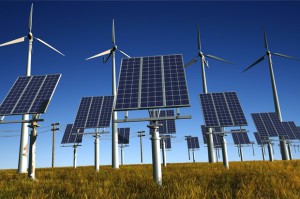After discussing some of the pros and cons of solar and wind energy in previous segments, the final instalment of this series will discuss the international response to wind and solar.
To say definitively whether solar or wind power can be cheaper than conventional power is almost impossible. Power costs depend on so many different variables, from weather patterns, to the number of conventional energy companies operating in a country, to how large the existing energy grid is, to how subsidized certain energy industries are. Generally, wind turbines and solar cells are more expensive to build and cheaper to run than traditional power stations.
Denmark and Germany have jumped on the renewable energy bandwagon but are now experiencing some buyer’s remorse. The two countries have higher power costs than any other country in Europe. Germany currently gets 12% of their power from solar and wind and is targeting to have 40-45% of power supplied by renewables by 2025. Denmark currently gets between 20-30% of its power from solar and wind and hopes to get up to half by 2020. Denmark currently doesn’t have the infrastructure or the demand to use all of the wind power that it produces during the night, and so exports that power to Norway and Sweden. High levels of renewable energy subsidies in both Denmark and Germany are contributing to skyrocketing power costs in the European nations.
The rise of wind and solar power means more competition for conventional power providers, who have historically enjoyed few competitors and a comfortable hold on local economies.
While the economic situation seems bleak for wind and solar energy, in the long-term making the switch, or at least relying on wind and solar power as much as possible may save the average consumer money. In the United States, making the switch to solar panels can pay for itself in 10-20 years, depending on how cheap conventional power is in your state. At some wind farms in Australia, wind power is already cheaper than fossil fuels.

Solar and wind energy are accused of being inefficient and expensive, and therefore not worth it especially when conventional power is cheap and reliable. However, a lot of the inefficiency comes from trying to install solar and wind power in less than ideal conditions. It doesn’t necessarily make sense for Germany and Denmark, northern European countries that require the most power in the cold, dark winter months, to invest heavily in solar power. In addition, Germany and Denmark are both heavily subsidizing renewable energy, whereas Australia has gone the more effective route of increasing taxes on coal and natural gas.
There is no doubt that solar and wind power has environmental, political, and economic obstructions. Nevertheless, technology is evolving at an alarming rate and it is now the political obstacles that must be cleared. The rise of wind and solar power means more competition for conventional power providers, who have historically enjoyed few competitors and a comfortable hold on local economies. Unfortunately, intermittent power sources currently work best when they work in tandem with conventional power. Wind and solar power can still become more efficient, reliable and cost effective, but these are all problems that are in the process of being solved. The biggest hurdle for these renewable energies is the inability of traditional power to integrate these power sources into the existing system. It is not a question of ‘either/or’, but rather how to use both.




